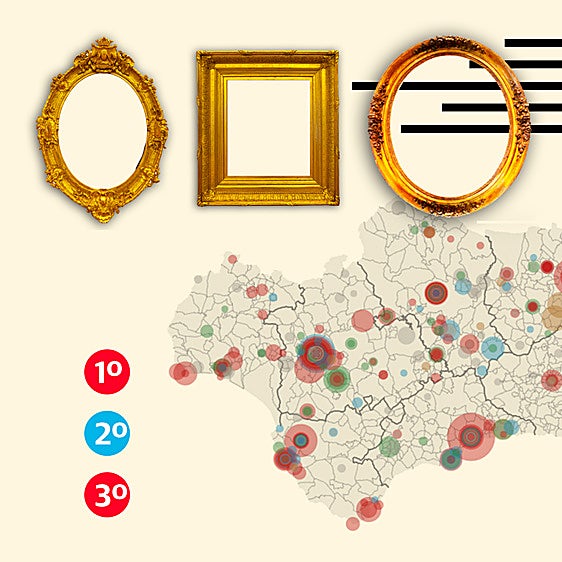The soul of Malaga: four city centre bars that maintain tradition
Preserving the essence of Malaga, they are now both a refuge for locals and an attraction for tourists
Cristina Vallejo
Malaga
Thursday, 27 February 2025, 20:47
Globalisation has reached the hospitality industry with the arrival of franchises and the homogenisation of the high street. Taken in isolation, certain streets could be in Santiago de Chile, Dublin, Malaga or even Istanbul. This makes maintaining the individuality of a place increasingly difficult as bars and restaurants cater to the tastes of both locals and tourists.
Yet in spite of this, as Borja Antolín, who runs La Campana in Malaga city's Calle Granada, points out, there are some establishments that now form part of "the resistance" to this change. In Malaga, there are a handful of small enclaves in which the essence of the city has survived, the culinary customs perfectly preserved. These are the bars filled with locals from all walks of life, discussing work and politics, celebrating their recent successes and drowning their sorrows.
And they all share something in common. "Bars in Malaga have always been synonymous with affordability," says Manuel Villena Páez who, together with his partner Patricia Carralero, has taken over the old Orellana bar after the founding family had to get rid of it. However, in view of what has happened in the last quarter of a century in Malaga, he does not have much faith that the business will survive. La Campana, which at one point boasted twenty establishments, now only has three, all acquired by its employees after the group went bankrupt.
There are however some centuries-old locals that have remained in the founding families. The Antigua Casa de Guardia and Quitapenas are now in the hands of the fourth and fifth generations. "We have survived two world wars, a civil war and two pandemics with our strong work ethic," says Marta Suárez, the manager of Quitapenas.
"Tourists flock here because they are looking for an authentic Malaga experience. This is genuine, there is nothing fake about this," explains Alejandro Garijo, standing between the bottles of wines. The fact that it has become a tourist attraction has not taken away from its authenticity. Garijo has accepted the responsibility of being the "guardian" of the tavern so that the next generations can enjoy this emblematic place.
The stories of these places, each one slightly different, are plagued with traumatic changes of fortune. In these tales appear Queen Isabel II, freemasonry, prisons and Franco. Lawyers, businessmen and even politicians have run these institiutions, including an old republican mayor.
Marta Suárez belongs to the fifth generation at the helm of the Quitapenas taverns. Although she is not the first woman to have worked in these bars, she is the first to hold the position of manager. She proudly tells the story of the tavern which dates back to 1880. At that time, the vineyard that her great-great-grandfather had in Cútar, in the Axarquía, was affected by phylloxera. So he went to El Palo where he set up a restaurant and sold the wine that he produced with the few vines that remained healthy after the plague.
It became an obligatory stop for farmers who came from nearby towns to Malaga to sell their products. On the outward journey they had no money to pay so it was on their return trip, when they had sold their merchandise, that they paid off their debts. This arrangement built a sense of trust and loyalty and eventually It was the customers who gave the tavern its name. They said "Let's go where they take away our sorrows (quitan las penas)."
"It was the customers who gave the tavern its name. They said "Let's go where they take away our sorrows (quitan las penas)"
In 1891 came a stroke of luck. The family won the lottery of San Carlos and with that money they bought the building on Calle Juan Sebastián Elcano, where the winery was located until 2004. With the winery and the tavern, they began to expand and by the forties they had a total of 28 establishments throughout the province. Later, in the sixties, with the boom of tourism on the Costa del Sol and in particular the arrival of visitors from the north of Europe, her grandfather and great uncles were the "pioneers of wine tourism". They took busloads of tourists to the winery for wine tastings and at its peak in the 1990s, 90,000 people visited the winery in El Palo.
Quitapenas
"We have survived everything. World wars, a civil war, two pandemics, economic crises..."
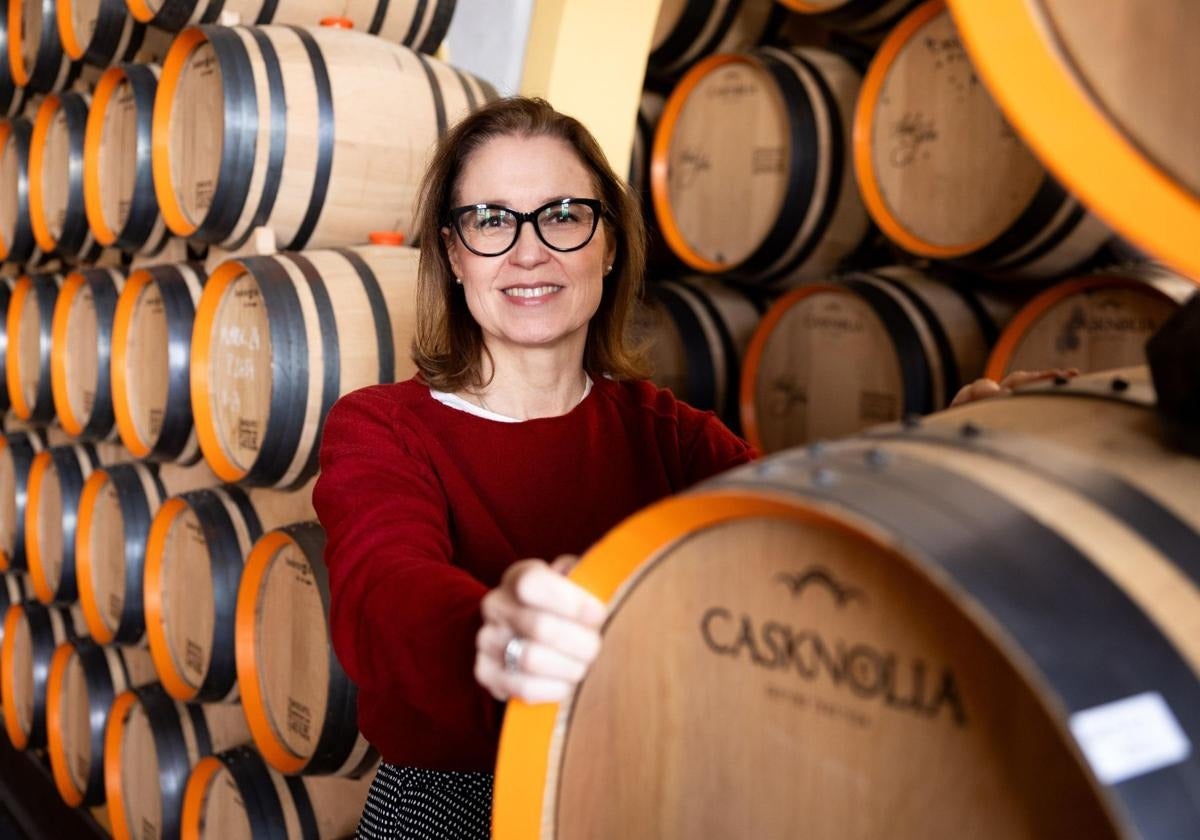
Zoom

Family businesses often have trouble passing down the generations; quarrels and disputes over inheritances arise. But this has not been the case for the Suárez family. "Our secret has been to work hard and preserve the quality of the products," she says. The current owners of the business are Marta's father and his siblings.
"They have had to be creative to keep the business going," she says. And she recalls that during all these years, practically a century and a half, they have survived everything. Two world wars, a civil war during which the winery was closed, two pandemics, in 1919 and 2020, economic crises...
"It has not been a bed of roses. There have been ups and downs. In the face of that, we have had to work very hard," she says.
Now they maintain the business of the winery, which is a member of the Regulatory Council of the Designation of Origin Malaga and sell to shops and export their products as well. Two bars have survived in Malaga's old town, in Calle Marín García and Sánchez Pastor, specialising in wines, Malaga cuisine and pescaíto frito (fried fish).
"I prefer not to talk about the business at Christmas dinners and lunches. My family tells me that I'm obsessed with Quitapenas"
Marta Suárez has been the manager of the company for ten years but she hasn't worked there all her life. Her mother taught her that she had to be professionally independent from the family business so she studied finance and worked for a few years at a multinational in Madrid. When in 2004, the winery moved from El Palo to Guadalmar and her financial knowledge was required, she accepted their offer to work for the family business.
Then in 2015 her uncle, who had been manager for four decades, retired, and so she became his natural successor. And the family couldn't be happier. In fact, she mentions another of the keys to the survival of the family business for more than a century. Each position has to be filled by the person with the right skills and training. Her cousin Víctor works with her, and another twenty or so employees who, she says, are like family.
"They have all been working here for at least fifteen to twenty years." And how are those Christmas lunches or dinners with the family, always talking about the tavern, the winery, work? "I try not to, because they tell me that I'm obsessed with Quitapenas."
Antigua Casa de Guardia
"This is an authentic place, not a fake or a recreation
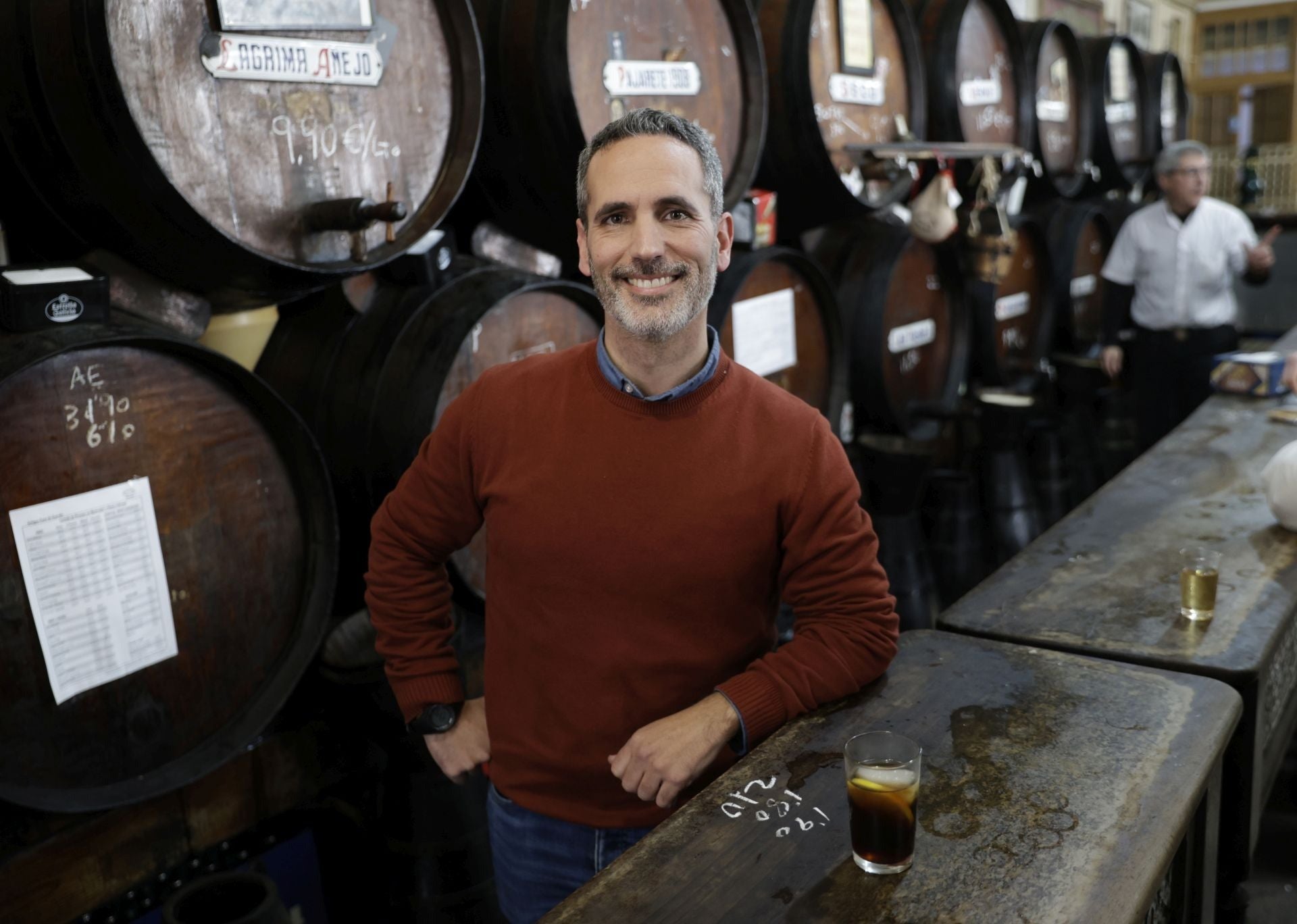
Zoom

It is twelve o'clock on a Thursday midday in January. The Antigua Casa de Guardia is packed with people and the first customers are already being served. Most of them are tourists taking pictures of the authentic century-old tavern whose history is intertwined with that of Spain.
Although there are people who believe that the origin of its name is due to the fact that in that place was located a barracks of the Civil Guard, in reality it comes from its founder in 1840, José de Guardia. A businessman with an interest in wine, he set up the bar in Calle Ollerías.
Soon the tavern had acquired a winery because the entrepreneur wanted to produce his own wine. In 1862, at an agricultural fair in Paseo de Reding, his stand was visited by none other than Queen Isabel II. And it is remarkable that the sovereign stopped there more than at any of the other stalls.
José de Guardia, on that occasion, was presenting a transañejo muscatel that must have delighted the lady with whom the man from Malaga made "a certain friendship". So much so that, in addition to becoming a supplier to the the royal household, he was soon appointed governor of Segovia. De Guardia then left Malaga and handed the business over to Enrique Navarro, who decided to move from Ollerías to Atarazanas to its current location, in the middle of Alameda Principal.
Navarro hired to two brothers from Antequera, José and Antonio Ruiz Luque, who became his right hand men. So when Navarro retired, he transferred the tavern and winery to the Ruiz Luque brothers, who gave the tavern its current name, Antigua Casa de Guardia. These two brothers were the uncles of Alejandro Garijo's grandfather, who would later take over the business.
"He was an innovator, a true intellectual of the time," says his grandson. José Garijo Ruiz, the grandfather of the current manager, was imprisoned by Franco and during his stay in jail, a judicial administrator took charge of the business.
José Garijo Ruiz, the grandfather of the current manager of the tavern, suffered imprisonment under Franco and during his stay in prison, a judicial administrator took over the business
José Garijo Ruiz had come to Malaga from Antequera to study law. He lived with his aunt and uncle, whom he helped out in the tavern. When he finished his studies, after working as an intern in some offices, he took over the bar in 1940. And his life left its mark on the history of Spain. He was a freemason and was imprisoned for several years during the dictatorship in a Malaga prison, then in Burgos and in Puerto de Santa María.
It was a period in which the tavern was in the hands of a judicial administrator, and so when José Garijo took over the business it was not at its best. But he was able to revive it successfully with innovative ideas including taking control of the entire wine process, from the grapes to the tavern, so that today 90% of the winery's production is sold to the tavern and the tavern only sells the wine from the winery.
"We take care of our solera, our old wines, that is our greatest treasure," says Alejandro Garijo, who adds, "that is also our philosophy, the winery is for the tavern and the tavern is for the winery."
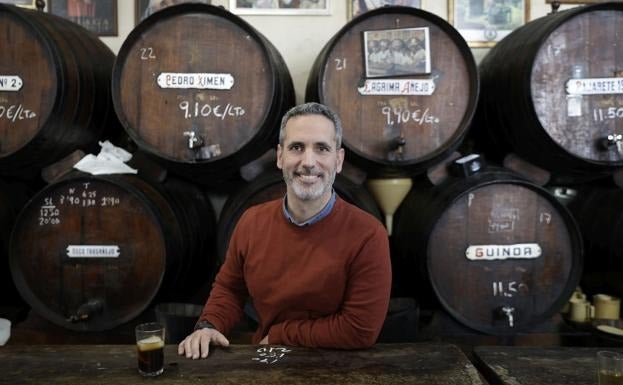
Zoom

Since 1996, when his grandfather passed away, the tavern and the winery have been separate companies. The former was left in the hands of his youngest son, Antonio, who is still the owner, although it is Alejandro who manages it. The winery was left to other family members. They maintained an unbeatable relationship but a couple of years ago, Alejandro, his father Antonio and his brother Javier became the main shareholders of the winery in their eagerness to keep the tavern and the winery together. In this way they want to continue and ensure that the symbiotic relationship that his grandfather believed should exist between the winery and the tavern continues to endure, making it possible for the business to remain true to its values.
Alejandro's partner told him that when she was a child she used to go with her mother to the tavern to take her father lunch, because he was a taxi driver and would stop there. "Everyone has a story to tell about the Antigua Casa de Guardia"
Alejandro Garijo feels the weight of responsibility on his shoulders. He considers himself a "guardian" of a tavern that is now visited by many tourists and which also fills up with locals from Malaga. He smiles when he explains how at weekends families go there to drink pajaretes and the adults tell how they used to go there as children with their parents and grandparents.
Although the most precious anecdote is the one that directly involves Alejandro. His partner told him how when she was a little girl she used to go with her mother to the Antigua Casa de Guardia to take lunch to her father, who was a taxi driver. "Everyone has a story to tell," he says. He also boasts that if foreigners go there it is because they want to be in a unique place with local people, people from Malaga. "They are looking for a typical place that is not a fake or an imitation."
Orellana
"Many of those who set up hotels and restaurants have no experience in the hospitality sector, they are investors"
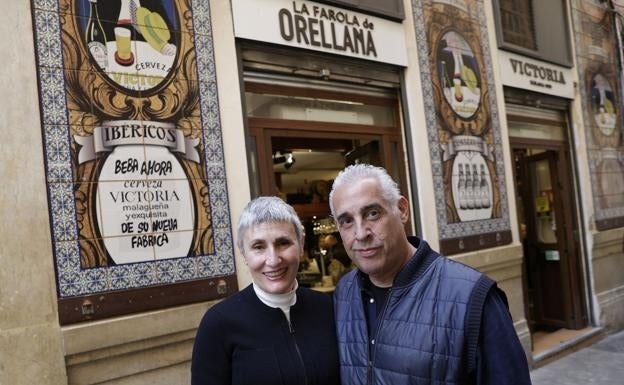
Zoom

Now "La Farola" has been added to "Orellana." This addition to the original name has been made to the façade on Calle Moreno Monroy. Twelve years ago, the traditional tavern passed into the hands of Manuel Villena and his partner Patricia Carralero, who are in the restaurant business with five other establishments.
"The owner of the premises told me that he was leaving and so we took over the business, keeping its traditions alive," Villena says. When they took over the business they gave the establishment a facelift, both inside and outside, but they stayed true to its orginal character. "It dates back to 1938. Whoever doesn't know Orellana doesn't know Malaga," Villena says.
The regulars, both locals and foreigners, enjoy the traditional tapas and raciones of meatballs, tripe, pork cheeks, as well as seafood and fish, and a variety of other dishes. The music fits the scene and the drink is Victoria beer, or wine. Villena shows, for example, a Martín Códax, which is part of their collections.
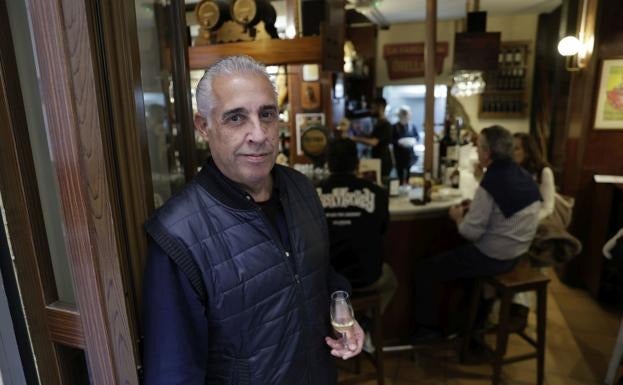
Zoom

"Taverns have always been synonymous with affordability. So their engine has to be well-oiled. In a tavern, people have a beer, a tapa and leave, and then another one comes in, and it starts all over again," explains Carralero. It's non-stop. On the other hand, in a restaurant, although the menus and the products have to be scrupulously selected, the rhythm is more relaxed, there can be a couple of shifts for lunch and another couple of shifts for dinner.
"Weekends at the tavern are crazy," says Villena, eventhough they have expanded the space by taking over the premises across the street. It looks more modern and less like a tavern, but the product served on both sides of the street is the same.
‘These establishments have been a key part of the economy, but now they are asking a fortune for the rent of the premises’
Villena and Carralero analyse why there are so few of the old taverns left in Malaga, unlike in Seville, for example. "These establishments have been a ke ypart of the economy but now they demand a fortune for the rent of the premises. This adds up especially when you consider the salaries of the staff, electricity, the products and taxes. A tavern had always been synonymous with affordability," they explain. And they also mention another concern.
"In the last 25 years, many of those who set up hotel businesses are not hoteliers, they are large investment groups that do not know the business and do not provide quality." And for all these reasons, Villena is pessimistic. He has no children, so when he retires and leaves the business of the old tavern Orellana, he believes that no one will take over from him. "When I leave, they probably won't keep this tavern as it is," he concludes.
La Campana
"This is for the ordinary people"
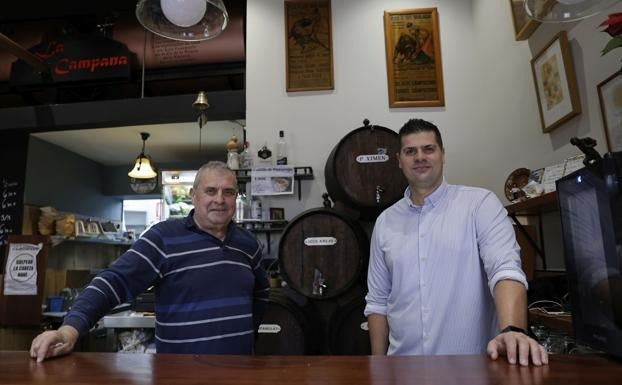
Zoom

Another survivor is La Campana. The tavern was founded by Salvador Pérez Marín, one of whose descendants, Narciso Pérez Texeira, became mayor of Malaga in the 1930s, during the Second Republic.
The oldest of the taverns was Puerta del Mar, which opened its doors in 1905 and no longer exists. La Campana became a network of more than twenty taverns throughout the province and even had a property in Madrid, but in the 1990s it went into decline and in 1996 the group went bankrupt. All the establishments disappeared except for three, the one in Carranque, the one in Torremolinos and the one located in Calle Granada.
The workers of the taverns decided to save the company and now they boast that 2La Campana is to taverns what Magefesa is to the pressure cooker. We are not one of those bars that cater to foreigner by advertising an open kitchen all day.
‘We are not one of those bars that adapt to foreign customers by advertising an open kitchen all day, no’
The La Campana worker who took over the tavern in Calle Granada is Salvador Antolín, who has just retired. "I've been a barman all my life. I worked with my father in La Campana when there were bars all over Malaga. They would tell you that this evening or tomorrow you were needed in Calle Granada, in Carranque, in Reding, in Antequera or in Puerta del Mar, and so I have worked in so many of the bars in the area," he says proudly. His son, Borja, who has succeeded him as the head of the business, adds "We are the resistance."
His customers, he says, are mainly from Malaga, as well as some visitors from the rest of Spain and other countries. There are many expats who have been coming here for 25 years. In any case, he announces "we are not one of those bars that cater to foreign customers by advertising an open kitchen all day, no." "This is a business that is doing well, but you can't get complacent" Borja Antolín adds.
The new family that has taken over La Campana in Calle Granada has made changes, refurbishing the premises.
"We have had to modernise, especially the bathrooms and the electrics all while respecting the tavern's traditional aspect." The ceiling is decorated with photos of the former splendour of this bar.
"Grandparents, parents and now their grandchildren have come here and that is a source of pride. We also see that when the locals receive friends from abroad, they bring them here to show them the real side of the city," they emphasise.
"With the refurbishment, we also set up some tables and opened a terrace. At the beginning we only sold wine but now we serve more products." They explain that the most popular dishes among their clientele are fried octopus, marinated fish and prawns.
And to drink, it's mostly beer in the summer, and wines in the winter. They are committed to using Malaga produce and says that what has not changed is what they consider to be a tavern.
"It is a place is for the people, for ordinary people."
Right now the building above them is under construction because it is going to be converted into a hotel.

